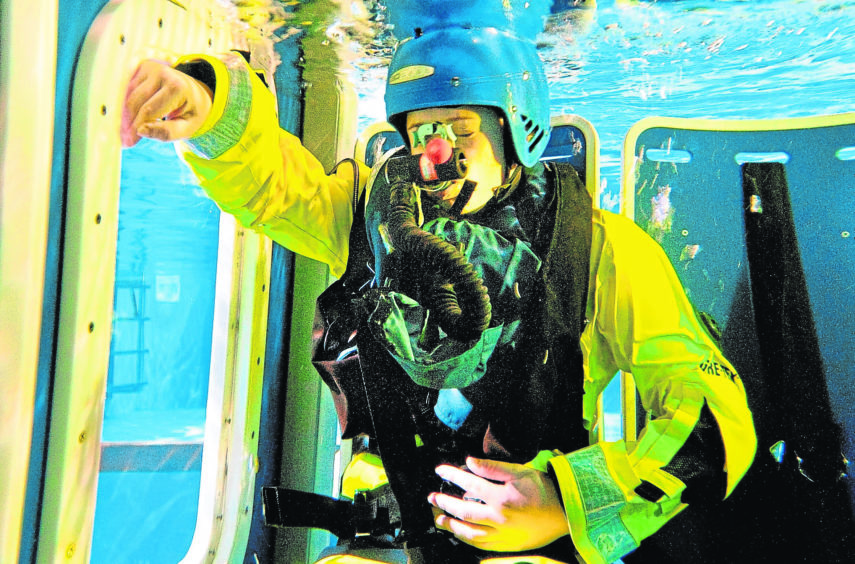
The uncertainty caused by the outbreak of Covid-19 has touched every part of the North Sea oil and gas sector, not least businesses that supply the survival training the industry needs to keep ticking over.
So when Covid-19 forced operators to reduce offshore staffing on platforms and rigs, where did it leave firms that rely on having a steady flow of workers coming through their doors for top-ups?
Survivex, an Aberdeen provider of offshore survival, firefighting and industrial skills training, had to furlough all staff when the Covid-19 crisis began and has only recently started to bring some workers back to work.
Paul Knowles, vice-president of training at parent company 3T Energy Group, said: “The furlough scheme has actually been a positive for us in that we’ve been able to retain all of our trainers, whilst looking to understand what the market will look like post-Covid-19 – but we’re only back to 30% capacity at the moment.
“We’ve really been covering the core courses that clients are asking for, while continuing with medicals for offshore staff.”
Knowles said it was probably “too early to say” when the Aberdeen facility might be back to full capacity, but added that the firm is “heavily into offshore wind” and considers itself the top UK training provider for that market.
He said: “We also do industrial contracts and nuclear power station training, so we’ve got a few course offerings.
“In Aberdeen, all the different companies we work with, like Wood, have their own energy diversification plan so we will follow them – we’re very aligned with the market.
“We see ourselves first and foremost as a health and safety training provider and if we look across multiple sectors there’s probably 60-70% of our content can be transferred – every sector has a different accreditation that they require.
“Although our centres have been closed we’ve been actively working on ‘managed training services’ in the background for our key clients such as Total, Wood and Bilfinger.
“We’re also looking at offshore accreditations for virtual and video learning.”
New guidelines and rules are also causing concern – both offshore and onshore – with uncertainty around how they will be adopted by North Sea firms.
Additionally, certain training services offered by Survivex have to be redesigned to conform to new social-distancing rules.
Mr Knowles said: “It’s really difficult for us to say right now how things will go and it’s really dependant on how operators take the new legislation on board.
“We’re still seeing critical training, but we’re very much demand-driven from the operators.
“We’re managing it on a week-by-week basis, what we’ve got scheduled and the expiry dates on the management training services that we have, but I think that the part-time furlough changes will be something that will drive demand and allow us to offer a wider breadth of courses than we are currently offering today – our ethos is that you’ve got to be open to be open.”
Knowles added that although the furlough scheme had provided a little flexibility, it has also created a degree of instability in forecasting future demand.
Meanwhile, RelyOn Nutec, a safety, drilling, emergency response and crisis management training provider for the offshore sector, reopened its training facilities in Aberdeen and Teesside after implementing significant changes based on UK and Scottish Government guidelines.
Opening in early June, the facilities have been audited to understand best practice to manage Covid-19.
The firm also undertook a number of inspections with clients to demonstrate the measures and offer reassurance that users are training in a safe environment.
The number of employees at each site has been reduced – as well as the maximum number of those attending each course.
Every delegate, visitor and staff member must now undergo health screening, which includes a temperature reading, and wear a face mask on arrival.
Additional personal protective equipment (PPE) for use in the pool and exercises have also been adapted to ensure sufficient distancing.
A spokeswoman for RelyOn Nutec said: “Social-distancing rules and one-way systems have been set up in all centres with additional procedures in canteens to ensure separation.
“Some courses can also be delivered digitally, via e-learning or combined with face-to-face training where applicable.
“We also provide a fully outsourced training management service, underpinned digitally by our in-house software tool WorkSafe, which ensures that the forward planning and the associated logistics of training and travelling offshore are managed as effectively as possible during this difficult time.”
Recommended for you
